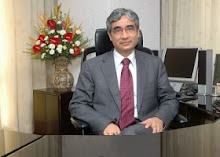I delivered this speech to the Class of 2006 at the IIM, Bangalore on defining success. This was the first time I shared the guiding principles of my life with young professionals.
I was the last child of a small-time government servant, in a family of five brothers. My earliest memory of my father is as that of a District Employment Officer in Koraput, Orissa. It was, and remains as back of beyond as you can imagine. There was no electricity; no primary school nearby and water did not flow out of a tap. As a result, I did not go to school until the age of eight; I was home-schooled. My father used to get transferred every year. The family belongings fit into the back of a jeep - so the family moved from place to place and without any trouble, my Mother would set up an establishment and get us going. Raised by a widow who had come as a refugee from the then East Bengal, she was a matriculate when she married my Father.
My parents set the foundation of my life and the value system, which makes me what I am today and largely, defines what success means to me today.
As District Employment Officer, my father was given a jeep by the government. There was no garage in the Office, so the jeep was parked in our house. My father refused to use it to commute to the office. He told us that the jeep is an expensive resource given by the government- he reiterated to us that it was not ”his jeep” but the government’s jeep. Insisting that he would use it only to tour the interiors, he would walk to his office on normal days. He also made sure that we never sat in the government jeep - we could sit in it only when it was stationary.
That was our early childhood lesson in governance - a lesson that corporate managers learn the hard way, some never do.
The driver of the jeep was treated with respect due to any other member of my Father’s office. As small children, we were taught not to call him by his name. We had to use the suffix ‘dada’ whenever we were to refer to him in public or private. When I grew up to own a car and a driver by the name of Raju was appointed - I repeated the lesson to my two small daughters. They have, as a result, grown up to call Raju, ‘Raju Uncle’ - very different from many of their friends who refer to their family driver, as ‘my driver’. When I hear that term from a school- or college-going person, I cringe.
To me, the lesson was significant - you treat small people with more respect than how you treat big people. It is more important to respect your subordinates than your superiors.
















